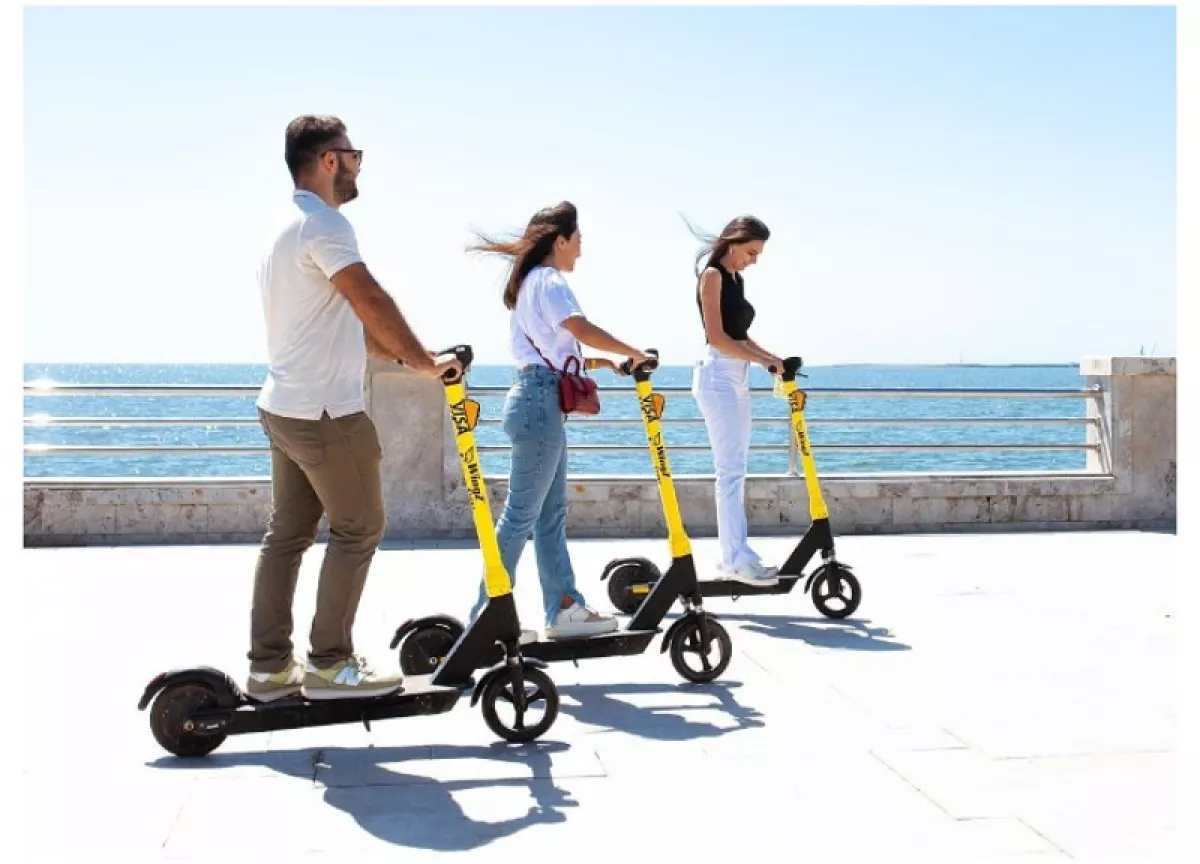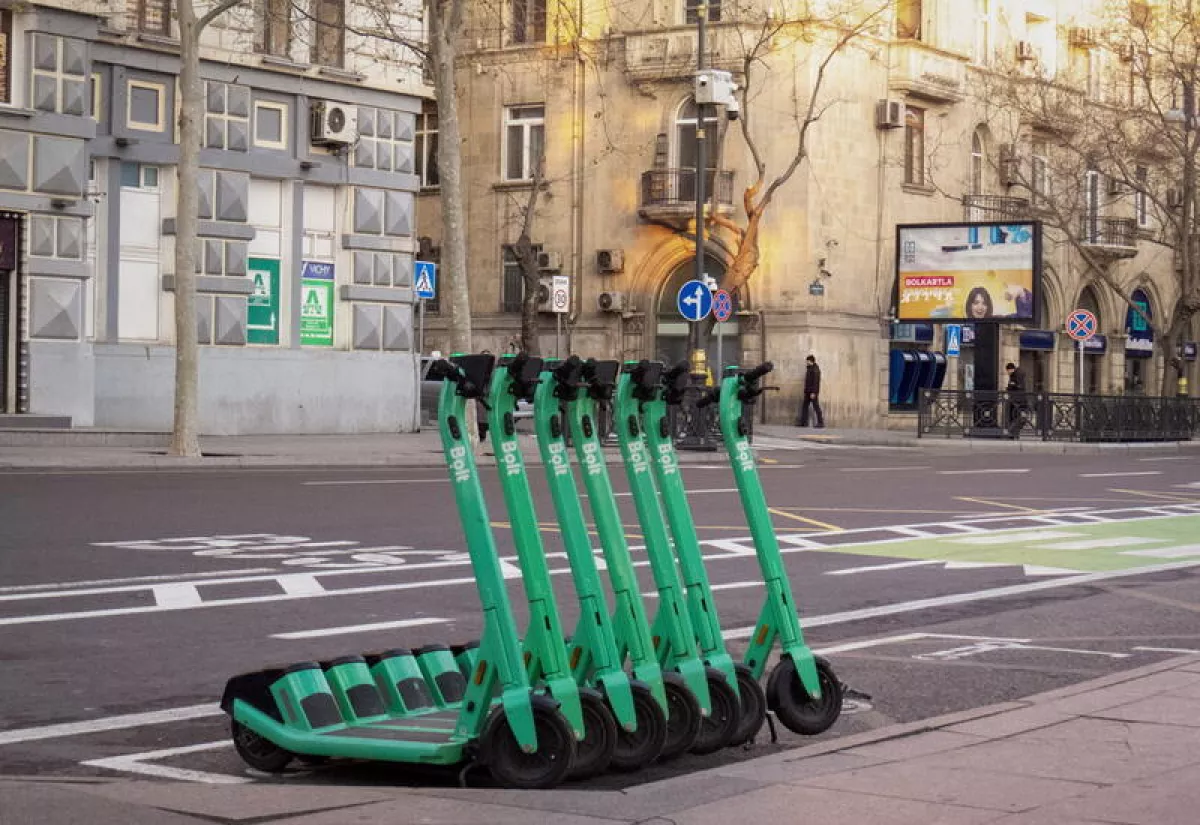Azerbaijan's transition to electric micromobility gains momentum Green mobility revolution
According to data from the leading research and consulting firm Data Bridge Market Research, the global micromobility market is expected to grow at a compound annual growth rate of 13.10% from 2023 to 2028. This surge in demand is driven by the high volatility of the fuel market and the increasing need for individual electric vehicles in overpopulated megacities.
Over the past three years, these global trends have become mainstream in Azerbaijan as well: in particular, Baku is developing the road and parking infrastructure for micromobility, and the rental of electric scooters and bicycles has been established. A significant step towards the development of this sector came with the November 1 Cabinet resolution, which exempted the import of components for bicycles and scooters from customs duties, aiming to localize their assembly in Azerbaijan.
Research from Data Bridge Market Research indicates that micromobility markets are accelerating due to increasing investments in small electric vehicles by key multinational companies and support from governments worldwide, amid efforts aligned with the UN climate agenda and the global energy transition by 2030.
Over the past decade, electric bicycles, scooters, mopeds, Segways, unicycles, and other devices with electric drivetrains (electric bicycles also offer mechanical chain drives) have become common on the streets of most cities around the world, and the popularity of this mode of transport continues to rise each year. Despite their lower carrying capacity and limited passenger numbers, micromobility devices have proven to be an ideal solution for navigating densely populated megacities, where traffic jams and a lack of parking spaces are constant challenges. Given the rapidly increasing cost of car parking in many countries and restrictions on vehicle access to city centres, the future looks promising for electric mobility.
The compact size and lightweight design of these electric devices enable rental companies operating in this market segment to utilize small sections of city streets for establishing rental stations, allowing them to quickly service and charge the batteries. As production ramps up, particularly in China, retail prices for electric scooters and bicycles are gradually decreasing, leading to an increase in individual ownership of these devices. Owners are now using them not just for recreational activities and Sunday outings, but also for daily commutes to work or university.
Depending on the type of device and battery capacity, they are ideal for short trips (2–5 kilometres). Electric bicycles and scooters are also well-suited for medium distances (15–20 kilometres) along busy streets without the need for recharging. These electric devices are lightweight, yet they can reach impressive speeds: scooters can travel at 30 km/h, bicycles can accelerate to 45 km/h, and scooters can exceed 60 km/h. Given these advantages, it is not surprising that forecasts indicate the global electric micromobility market could reach $42 billion by 2030.
In recent years, the micromobility market has been rapidly developing in Baku, where the relatively mild climate and lack of snow in winter allow for the year-round use of microelectric transport. This off-season usage is crucial. In most cases, electric modes of transport are popular among young people, couriers in the catering sector (food delivery), and are also favored by international tourists. However, it is increasingly common to see office workers on the streets of Baku commuting to their workplaces on rented or personally owned electric scooters and bicycles.

Notably, while five years ago, electric micromobility devices were primarily rented out in the Coastal National Park (Boulevard) or the Icherisheher reserve, in pedestrian zones and parks in the historical centre of the capital, today rental stations can be found even in more remote areas of Baku. Furthermore, on August 24, 2024, Baku launched its first bike-sharing service, allowing users to rent bicycles, travel, and return them at any of 50 designated parking spots throughout the city. The locations of these parking spots were strategically chosen based on their proximity to metro stations, bus stops, educational institutions, and major shopping centres.
Like electric scooters, electric bicycles are equipped with a GSM tracking system and mobile payment options via QR codes, greatly simplifying their use for passengers and operating companies. According to the Azerbaijan Land Transport Agency (AYNA), a total of 211 parking spaces for various types of small electric vehicles have been designated in Baku, with plans to increase this number soon. “In Baku, there are 650 rental orders for bicycles each day. From August to the end of October, 38,000 people registered for the bike rental service,” stated Joshgun Mammadov, head of the micromobility department at AYNA.
Following amendments to the Law on Traffic passed by the Milli Majlis in June, individuals aged 14 and older are permitted to operate small electric vehicles with a motor power of no more than 1 kW on the roads of Azerbaijan. Currently, under existing regulations in the country, most types of micromobility electric vehicles—except for electric scooters—are classified alongside pedestrians. This classification allows users to ride electric bicycles, scooters, or Segways along the roadside and even in pedestrian zones, while also permitting them to travel on public roads.
To avoid disrupting the busy traffic flow in the capital, the AYNA project for developing micromobility infrastructure in Baku has established dedicated bicycle lanes totalling 20 kilometres. These lanes cover central areas of the city, including Istiglaliyyat Street, Azerbaijan Avenue, Mirzaagha Aliyev Street, Bulbul Avenue, Parliament Avenue, Fikret Amirov Street, and the Coastal National Park area (Boulevard), among others.
The project includes road marking, installation of traffic signs, construction of ramps for easy access to the lanes, and the placement of nearly 1,200 protective barriers at hazardous locations. Additionally, special bicycle sections have been integrated at 25 traffic lights. Given the growing interest in electric micromobility among Baku residents, and in efforts to reduce road congestion and protect the environment, the bicycle lane network is planned to be expanded to 50 kilometres as part of the "City for Residents" concept.

The recent Cabinet of Ministers resolution regarding amendments to the "Commodity Nomenclature of Foreign Economic Activity, Import Duty Rates, and Export Duty Rates" indicates that trends in micromobility in Azerbaijan are becoming stable and long-term. Signed by Prime Minister Ali Asadov, the resolution eliminates customs duties on the import of components for bicycles and scooters until 2028. This decision was made in response to requests from domestic manufacturers aimed at optimizing customs duties on imported components to encourage their industrial assembly in Azerbaijan.
Previously, the import of spare parts for bicycles and scooters was primarily subject to ad valorem customs duties of 5% and 15%, with specific duties set for certain components. This new measure aims to stimulate local production and foster the growth of the micromobility sector in the country.
To date, only one industrial assembly project for bicycles has been localized in Azerbaijan: the ISMA BIKES factory, which commenced operations in August 2016 in the village of Diyalli in the Ismayilli region. Built in collaboration with a specialized Bulgarian company, the factory was designed to assemble 30,000 children's, road, and multi-speed sports bicycles annually from imported components. While the majority of the production was aimed at the domestic market, trial shipments were established in subsequent years to Georgia and the UAE.
It was initially planned that over time, around 50% of the components would be produced locally, but due to a number of objective reasons, the factory eventually suspended its operations.
The new customs incentives for importing components may act as a driver for the resumption of activities at ISMA BIKES, as well as for the implementation of other projects focused on localizing the production of micromobility vehicles.








